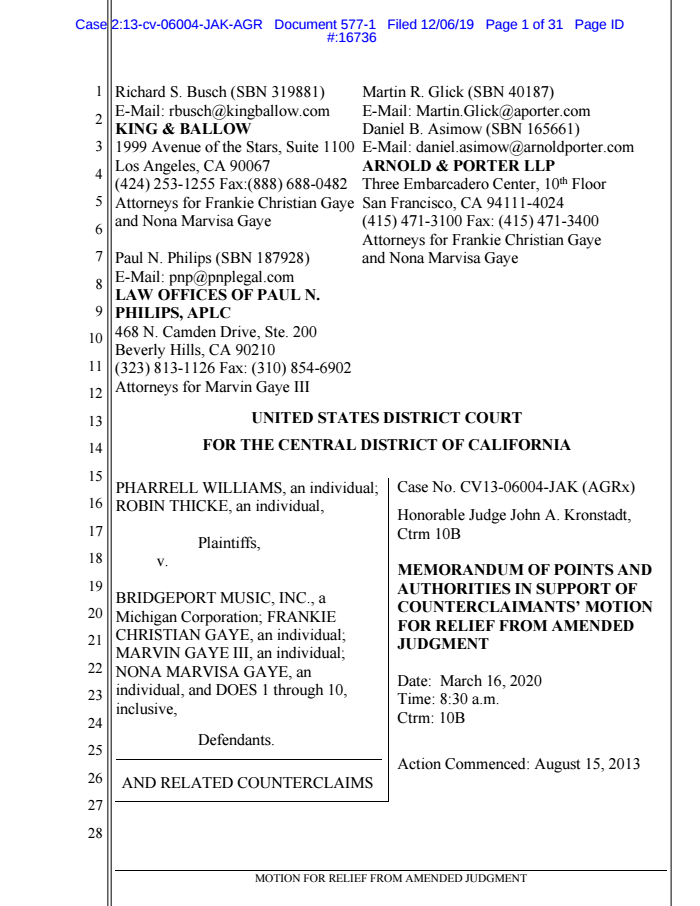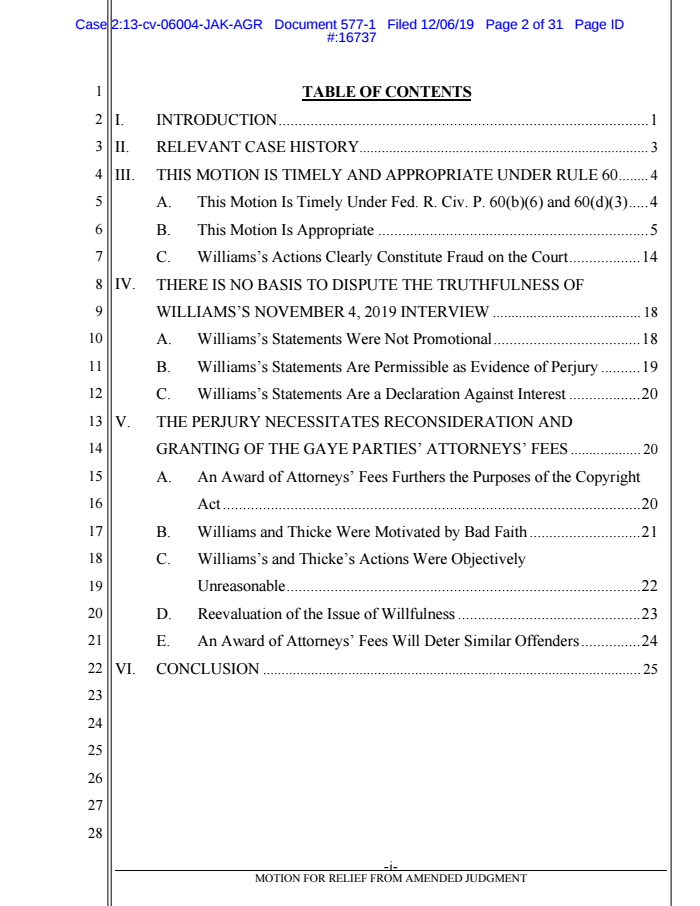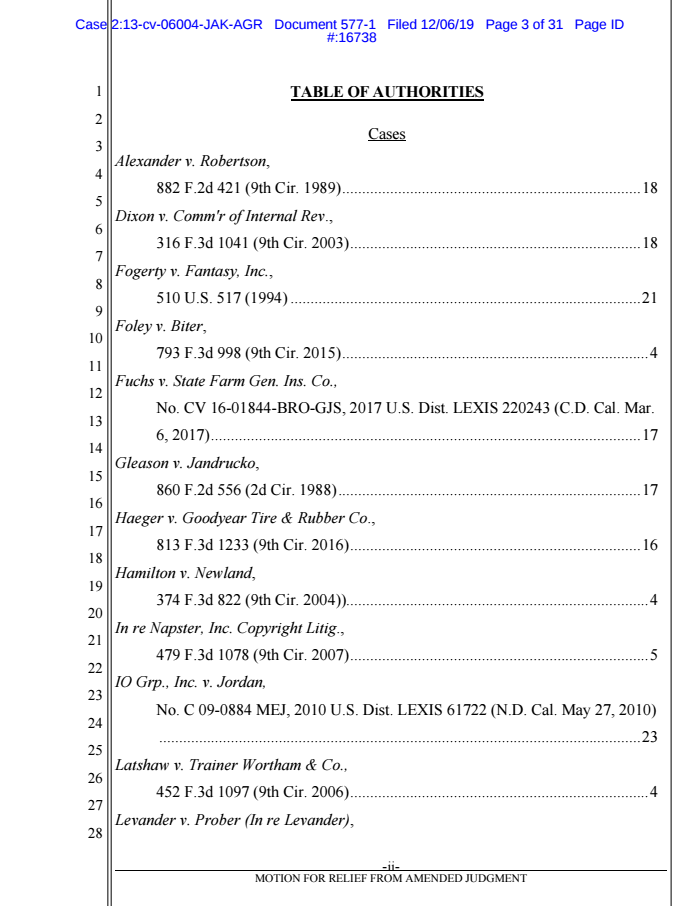Marvin Gaye Family Brings Pharrell Back To Court Claiming Perjury
The lawsuit by Marvin Gaye’s family against Pharrell appears to be the gift that keeps on giving, with the former now bringing Pharrell back to court once again, this time claiming the producer and pop star committed perjury.
_________________________________
Guest post by Mike Masnick of Techdirt
The Blurred Lines lawsuit is the case that just keeps on giving… if the gift you’re looking for is legal shenanigans and ridiculous situations. As you’ll recall, that was the case in which Marvin Gaye’s family suggested that because the Pharrell/Robin Thicke song “Blurred Lines” paid homage to Marvin Gaye’s “Got To Give It Up” with a similar groove, that it was infringing on Gaye’s copyright. The whole thing was crazy — and somehow the court bought it. Despite there not being any actual copying of any copyright-protected content, just the mere similarity of feeling in the song is enough to infringe.
This has created quite a frenzy of nonsense, with artists now afraid to even mention their inspirations, lest they get sued, and sued again for every song they release. The situation has gotten so insane that even the RIAA has stepped in to say that perhaps copyright has gone too far in protecting works. Yes, the RIAA said that copyright may be protecting too much. This is pigs flying, snow in hell, cats and dogs living together, madness.
And, believe it or not, the original case apparently is not fully over yet. During the original case, Pharrell gave a deposition claiming that he didn’t intend to copy Marvin Gaye:
“I did not go in the studio with the intention of making anything feel like, or to sound like, Marvin Gaye.”

But… in a recent GQ published video interview between Pharrell and famed music producer Rick Rubin, Pharrell made an off-hand comment about this same issue. Throughout the interview, he talks about “channeling” other artists when he’s in the studio.
Then somewhere along the line he mentions the Blurred Lines mess, by saying (around 28 minutes into the interview):
Pharrell: But I think for the most part, what we always try to do was reverse engineer the songs that did something to us emotionally and figure out where the mechanism is in there, and as I said to you before, try to figure out if we can build a building that doesn’t look the same but makes you feel the same way. I did that in Blurred Lines and got myself in trouble.
Rubin: Ridiculously.
Pharrell: Stevie Wonder told me, he said, ‘you gotta get the right musicologists in there because juries don’t understand — it’s very technical what you’ve done.’
Rubin: Because the song is nothing like the song
Pharrell: Nope, but the feeling was.
Rubin: But the feeling is not something you can copyright.
Pharrell: No, you can’t copyright a feeling. All salsa songs sound pretty much the same.
Rubin: Yes. And reggae songs. Any genre.
Pharrell: 100 percent.
Rubin: Trap music sounds relatively similar.
Pharrell: But here’s the difference. What we failed– And it hurt my feelings. ‘Cause I would never take anything from anyone. And that really set me back…. But I was really hurt, because what I realized all too late was that what he was trying to tell me was that I needed to do was use my gift to make music, to reverse engineer the disparity between the truth and the jury’s uneducated opinions. And I say that, because rayon and silk feel the same, but we understand that there’s a clear difference. And that was what happened.
Rubin: Yeah.
Pharrell: Like, I really made it feel so much like it, that people were like, oh, I hear the same thing.
And, so, in a new filing by the Gaye Estate (first noted by THREsq), they’re claiming that Pharrell perjured himself in his deposition by saying that he had no intention to channel Gaye:
In the November 4, 2019 Interview, among other things, Williams admits the following:
(1) in creating a new song, he often tries to “reverse engineer” an older song that did “something to us emotionally,” so that he can “figure out where the mechanism is in [the original song],” and “build a building that doesn’t look the same but makes us feel the same way,” and that he “did that in ‘Blurred Lines’ and I got myself in trouble;” and
(2) he actually did too good of a job in this reverse engineering when it came to “Got To” and “Blurred”: “I really made it [‘Blurred’] feel so much like it [‘Got To’], that people were like, oh, I hear the same thing.”
As discussed further below, these admissions are irreconcilable with Williams’s repeated, sworn testimony in this action that: neither “Got To” nor Marvin Gaye ever entered his mind while creating “Blurred,” that he did not try to make “Blurred” feel like “Got To” or sound like Marvin Gaye, and that when creating music Williams looks “into oblivion. We look into that which does not exist.”
Hilariously, the filing tries to make sure that the court does not pay attention to other parts of the interview — notably, the long section about how it’s ridiculous to argue that you can copyright a “feeling.”
As a matter of introduction and clarity, and to avoid all doubt so there is no misunderstanding about what this Motion is not about: this Motion is not about whether Williams and Robin Thicke (“Thicke”) committed copyright infringement with respect to “Got To.” This Motion is also not about Williams’s very public pronouncements in this Court, in the media, in the November 4, 2019 Interview, and elsewhere that one cannot copyright a feeling, that all music within a genre supposedly sounds the same, and his belief that “Blurred” and “Got To” are not compositionally the same (one supposedly being “rayon” and one being “silk” according to Williams). The jury, this Court, and the Ninth Circuit Court of Appeals have all spoken on those issues.
The whole case is a mess, but this part of the dispute, including this silly claim of perjury, is just an attempt to get even more money out of Pharrell, this time in seeking attorneys’ fees for the Gaye family’s lawyers.
And, of course, all it will really do is remind musicians to never credit their sources, to never talk about their process, and to hinder future musicians for years, if not decades. All for an extra buck.DOCUMENTPAGESTEXTZoom



«Page 1 of 31»
3 Comments
Comments are closed.